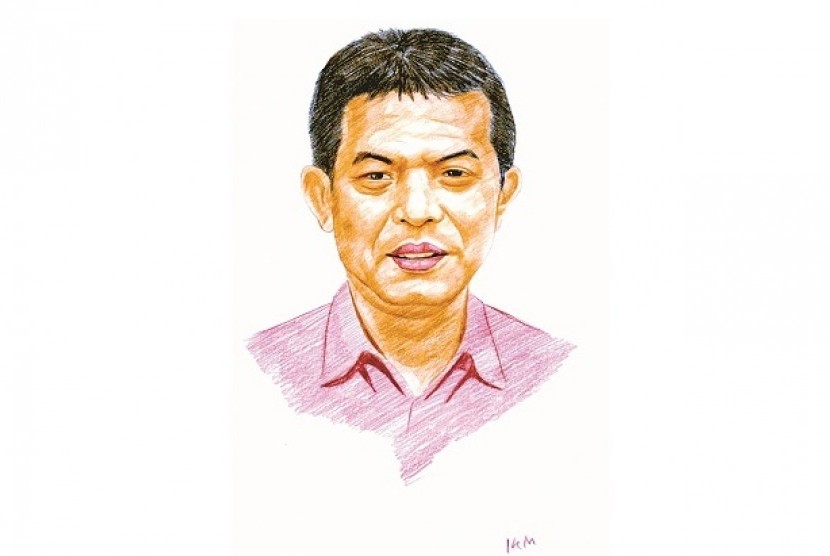By Ikhwanul Kiram
Egyptian were always proud when a foreigner called it Misro Ummud Dunya. Egypt was a mother or center of the world. If you brought up this topic when you visited to “the Country of a Thousand Minarets”, the conversation with the Egyptian would soon be familiar. Moreover, if you added with the question, “Then who is the father?”
When the Egyptian was confused to answer, quickly answer your own question, “Indonesia abuha (Indonesia is the father).”Guaranteed, conversations would last forever. Yes, ummud dunya was not a courtesy calling. Compared to all countries in Middle East, Egypt was the oldest country. Its culture was also very high.
Pyramids which were the tombs of the pharaoh (king) and still stood tall until now were one of the evidence. Egypt history has been started since 3,200 BC. Al Qur’an stated stories of the Prophet who had lived, stopped by or passed by this country. They were Prophet Ibrahim (Abraham), Yakub (Jacob), Yusuf (Joseph), Musa (Moses), Harun (Aaron), Soleh, and Prophet ‘Isa (Jesus). Therefore, Egypt also often be called as ardhul ambiya’.
After Islam came, Egypt also had strategic roles. Dynasty after dynasty came and went. Every dynasty left historical evidences such as masjid (mosque), palace and museum. One of them was Masjid and University of Al Azhar built by Fatimiyah Dynasty on 970 – 972 C. Thus, Al Azhar has become one of the oldest universities in the world and still existed until now and become “the Mecca” to many scholars to learn about Islam.
In the modern history which started from the fall of monarchy and the rise of republic with its first President Jamal Abdul Nasir, Egypt was very influential in the Middle East. Egypt was the first country to admit Republic of Indonesia’s independence, the founder of Non Aligned Movement (together with Indonesia, India and Yugoslavia), Arab League, and Organization of the Islamic Conference (OIC).
Egypt was also the most persistent on fighting for Palestine independence. Among others, Egypt was the most frequent on facing wars with Israel (1948, 1967, and 1972). Egypt’s high influence also caused by its largest population amongst all Middle East countries, which was around 82 millions of people. Geographically, it was also very strategic, in Asia and African continent.
This country was surrounded by Libya (West), Palestine and Red Sea (East), Sudan (South East) and Saudi Arabia. With such evidences, it was no surprise if Egypt development has always drawn world’s attention, especially because of its major influence in Middle East and Islamic world.
The most interesting development currently of course post fall of President Hosni Mubarak, a transition period from authoritarian period to democratic era. There were two issues that drawn in the observers and media. First, the constitution drafting. The ongoing debate in place still hasn’t touched the substantially or the content of the constitution itself. But more to who would arrange it.
According to the rules approved by provisional ruling Military Council (until the new president is elected), 50 percentage of the arranger consisted of Parliament members (Majelis Sya’b) and People’s Consultative Council (Majelis Syuro). Meanwhile, the other 50 percentage was elected from all society’s element or institutions. But, such composition was rejected by many sources, especially the liberalist which was one of the motor on demonstration against Mubarak regime.
The rejection because they (liberalist) concerned about Egypt’s New Constitution would be very Islamic. Because, the members of parliament and People’s Consultative Council had more than 70 percentage from Islamic party (Freedom and Justice Party/Ikhwanul Muslimin 48 percent and An Noor Party/Salafi 24 percent). And the regulations on constitution arranger composition must be approved by the Military Council before the Parliament and People’s Consultative Council election.
Al Azhar ulamas who were considered as moderate party apparently also rejected the composition of constitution arranger. Al Azhar ulamas although did not involve in politic in practice, but their influence were so big to the people. Many people expected Al Azhar to lead the new constitution arrangement.
Until today, the ruling Military Council still hung the new constitution arrangement until president election. The second issue related to president election. There were 13 president candidates who passed the requirements to take part in the election held on 23 and 24 of May. They came from the most liberal, moderate, most Islamic, until the figure from Mubarak’s regime.
The most prominent candidates based on the surveys before the election were three candidates. They were Abdul Munim Abul Futuh (former Ikhwanul Muslimin’s leader who ran as independent candidate), Amr Musa (former Foreign Secretary of Mubarak’s regime and forment General Secretary of Arab League) and Mohammad Morsi (Ikhwanul Muslimin’s official candidate).
Another candidate who was quite famous as well was Ahmad Shafiq who was Mubarak’s prime minister during his last days. On a several president candidate debate occasions, which became the first in democracy tradition in Middle East countries, Islam has been the major and most sensitive issue.
Including how’s the Egypt’s new constitution, whether Islam will be the state foundation, the main source of law,et cetera. President election’s result and new constitution arrangement were still in waiting. What matters, anything happened in Egypt always attracted attention. Supposing, Ummud Dunya alias “the Mother” is now looking for her identity. And, Egyptian new identity certainly would become huge influence to Arab and Islam countries, including Indonesia.
(Indira Amaranti)


